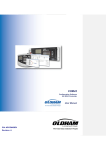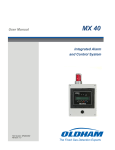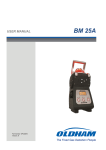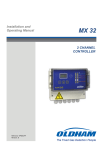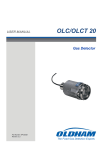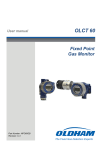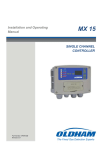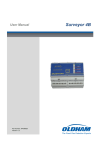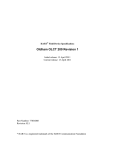Download OLDHAM AirAware User Manual
Transcript
User Manual AirAware Stationary Gas Monitor P/N: 6700-1347 Revision 6.3 The Fixed Gas Detection Experts AirAware 1 2 AirAware Dear Valued Customer: Thank you for buying and using the Oldham AirAware™ Gas Monitor. The AirAware™ can be relied upon for dependable service, day after day. It has been designed, manufactured, tested and proven under the most scrutinizing conditions possible. With the minimal care and maintenance described in this Instruction Manual, it will provide you with years of reliable monitoring. We sincerely hope that you be pleased with the performance of the AirAware™ in the months and years ahead. We urge you to call us with any questions or comments you may have. Often times a phone call and a question can save you hours of frustration. Please do not hesitate to contact us at + (1) 713-559-9280. All of us at Oldham appreciate the opportunity to serve you. AirAware 3 Table of Contents Warnings and Cautionary Statements ........................................................ 5 Configurations............................................................................................ 5 Unpacking The Instrument......................................................................... 6 Mounting & Installation ............................................................................. 7 Wiring ........................................................................................................ 8 Warm-Up And Operation........................................................................... 8 Set-up Mode ............................................................................................... 9 Bump Testing ........................................................................................... 12 Sensor Type ............................................................................................. 12 Low Alarm Set-up.................................................................................... 12 High Alarm Set-up ................................................................................... 13 4-20 On/Off** .......................................................................................... 13 4-20 mA Range** .................................................................................... 13 Audio Enable/Disable** .......................................................................... 14 Display On/Off......................................................................................... 14 Display Type ............................................................................................ 14 Set Cal Gas Concentration ....................................................................... 15 ModBus Address ...................................................................................... 15 Back To Normal Operation ...................................................................... 16 Alarms ...................................................................................................... 16 ModBus Interface..................................................................................... 18 Bump (function) Testing .......................................................................... 18 Zeroing ..................................................................................................... 19 Calibration................................................................................................ 20 Sensor Replacement ................................................................................. 21 Specifications ........................................................................................... 23 Replacement Parts & Accessories............................................................ 24 Calibration Kits & Replacement Cylinders ............................................. 25 Warranty .................................................................................................. 26 4 AirAware Warnings and Cautionary Statements Failure to perform certain procedures or note certain conditions may impair the performance of the instrument. For maximum safety and performance, please read and follow the procedures and conditions outlined below. Sensor openings and water barriers must be kept clean. Obstruction of the sensor openings and/or contamination of the water barriers may cause readings to be lower than actual gas concentrations. Configurations All versions include a bright 4 digit LED display as well as low and high visual alarm indication. AirAware - Base part number 68100056-ABCDE. A = Sensor Gas Type B = On-Board Alarm Option C = Output Options D = Power Option E = Vanity / Faceplate Cover Option A - Gas Type 1 = Carbon Monoxide (CO) 2 = Nitric Oxide (NO) 3 = Ammonia (NH3) 4 = Hydrogen Sulfide (H2S) 5 = Sulfur Dioxide (SO2) 6 = Nitrogen Dioxide (NO2) 7 = Chlorine (Cl2) A = Oxygen (O2) F = Hydrogen Chloride (HCl) B - On-Board 0 = No audio alarm 1 = On-board audio alarm C – Output Options 0 = None 1 = On-board relays 2 = 4-20mA output 3 = 4-20mA output and on-board relays AirAware 5 D - Power Option 0 = No output 1 = AC power adapter (installed) E - Vanity Plate (Faceplate Cover) Option 0 = None 1 = Vanity plate Example: 68100056-11211 means CO monitor with on-board audio alarm, a 4-20mA output, an AC power adapter (N.Am. Plug) and vanity cover. Unpacking The Instrument The shipping box should contain the following items. Account for each item before discarding containers. Quantity Part Number Description 1 each 6810 0056-XXXXX AirAware Instrument 1 each 6700 1347 AirAware Instruction Manual Note: Bias sensors (HCl, NH3, NO) are not installed in instruments prior to shipment. Refer to Sensor Replacement section (page 21) for instructions. After unpacking, if any item listed is missing, contact either your local distributor of Oldham products, or call Oldham directly at + (1) 713-559-9280. 6 AirAware Mounting & Installation The mounting height of the AirAware is dependent on the gas being monitored and the source of the gas. General mounting guidelines are as follows: Gas Heavier Than Air Similar To Air Lighter Than Air Will collect in low lying areas 3' (1m) above floor Breathing zone monitoring recommended 3'-6' (1-2m) above floor Will collect in high areas 3' (1m) below ceiling Ammonia (NH3) Carbon Monoxide (CO) Chlorine (Cl2) Hydrogen Chloride (HCl) Hydrogen Sulfide (H2S) Nitric Oxide (NO) Nitrogen Dioxide (NO2) Oxygen (O2) Sulfur Dioxide (SO2) With 5 conduit-type knockouts located around the outside edges as well as a back plate knockout for flush mounting, the AirAware offers maximum mounting flexibility. There is even provision for mounting on electrical outlets with 2” and 4” (North American) centers. 002 AirAware 7 To insure there is no damage to the main electronics, it is recommended that the circuit board be removed prior to relieving a knockout or drilling through the pilot points for the flush mount option. Extreme caution should be taken when removing and re-installing the circuit board so as not to damage it. Wiring Connect only to Class 2 power supply through approved conduit and enclosures in accordance with local authorities having jurisdiction. Recommended Cable: 3 or 4 conductors (application dependent), 24 AWG, stranded tinned copper, shielded cable Belden #9842 or equivalent. 003 Warm-Up And Operation All AirAware versions operate on 12-24 VDC. The Monitor version includes a 120 VAC power pack for North American electrical sockets (not included in the International version) that supplies 24 VDC to the instrument. Once powered, the instrument will go through an automatic self-test. During this time it will complete a full display segment test, brief audio and visual alarm test, software version, gas type, configuration M, C, T, CT (Note: “A” as an indicator of optional audio alarm) and finally a live continuous display of the gas concentration. During the first three minutes of operation the alarms will not activate and the 4-20 mA signal with be held at 3 mA (16 mA for O2).*** 8 AirAware Each AirAware utilizes electrochemical sensors that may require between 10 and 360 minutes (gas dependent) or 12-16 hours for NH3 and HCl to stabilize when initially activated. During this warm-up period, the unit may display concentrations of gas and possibly alarm. *** A flashing decimal point on the lower right corner of the display will appear for 3 minutes after start-up, calibration, bump, or programming. This is an indicator that the 4-20 mA signal is locked at 3 mA/16 mA and that all alarm functions are disabled. Once this flashing indicator clears, all functions will return to normal. During normal operation, the LED display shows: HCl 0.2 to 30.0 ppm in 0.1 ppm increments Cl2, NO2, SO2 0.2 to 99.9 in 0.1 ppm increments NH3 4 to 100 ppm in 1 ppm increments CO, H2S, NO 0 to 999 ppm in 1 ppm increments O2 0.0 to 30.0% by volume in 0.1% increments Set-up Mode The AirAware™ is a very flexible gas-monitoring instrument with many options. Listed below are the various programming modes and procedures required to select various options. 1. In order to make programming changes, remove the optional vanity plate (if installed) from the face of the instrument by releasing the locking tabs. 004 2. Loosen the 5 Phillips head (captive) screws on the faceplate allowing it to hinge downward to provide access to internal or buttons. (Labeled S1 and S2.) AirAware 9 005 3. Press and hold both the and keys on instrument faceplate simultaneously for 5 seconds. "Bump" will appear in the display indicating the instrument is now in the Set-up Mode. At this point the alarm relays* are disabled, audio alarms* are disabled, and the current output* locks at 3.0 mA for all gases except oxygen, which goes to 16.0 mA until set-up is complete. If no buttons are pressed within a 3-minute time period, the instrument reverts to normal operation.*** 006 4. Pressing the key will advance forward through the various options, while pressing the key will step backward. The internal keys act as or buttons (Page 9) to set the actual set-up values or parameters. * Indication of purchase option. ** Will not appear on menu if option not purchased. *** A flashing decimal point on the lower right corner of the display will appear for 3 minutes after start-up, calibration, bump, or programming. This is an indicator that the 4-20 mA signal is locked at 3 mA and that all alarm functions are disabled. Once this flashing indicator clears all functions will return to normal. 10 AirAware Mode Actions Taken BUMP Disables: • Visual alarms • Audio alarm* • Relay contacts* • Freezes 4-20 mA current output* SENSOR TYPE Display only of sensor type LOW ALARM Set values to activate: • Low alarm visual indicator • On-board audible alarm* • Relay contact #1* HIGH ALARM Set values to activate: • High alarm visual indicator • On-board audible alarm* • Relay contact #2* 4-20 mA ON-OFF** Turn analog out put ON or OFF* 4-20 mA Range** Custom scaling of 4-20 mA signal* AUDIO ON-OFF** Enable or disable on-board audible alarm* for gas alarms. Note: Fail and Fault conditions will always activate a pulsing audible alarm. DISPLAY ON-OFF Turn display ON or OFF when “ON”. DISPLAY TYPE Select option for: • “SAFE, LOW, HIGH”. • “NUMERIC” when “ON”. When “OFF” Blank display during normal operation. Note: Decimal point illuminated in far left corner of display. RELAY ENABLE/DISABLE** Turns Relays On/Off* SET CAL GAS Set the calibration gas value. MODBUS ADDRESS Set ModBus Address. NORM Return to normal operation mode. AirAware 11 * Indication of purchase option. ** Will not appear on menu if option not purchased. *** A flashing decimal point on the lower right corner of the display will appear for 3 minutes after start-up, calibration, bump, or programming. This is an indicator that the 4-20 mA signal is locked at 3 mA and that all alarm functions are disabled. Once this flashing indicator clears all functions will return to normal. Aborting the Set-up Mode is achieved at any time by pressing either the or key to select "NORM" and allowing the unit to sit for 5 seconds. Once in the normal run mode the alarm relays*, audio alarms* and 4-20 mA signal* will be fully functional in 3 minutes. Bump Testing This mode disables the audio* and visual alarms, relay outputs*, and freezes the analog output* at 3.0 mA for all gases except oxygen, which goes to 16.0 mA. In this mode, the display alternates between "BUMP" and the actual gas reading every half-second for three minutes. Once the display returns to the normal operation the audio* and visual alarms, relay outputs*, and current output* will return to normal operation after an additional three minutes. Sensor Type Identifies sensor type currently installed in instrument. Low Alarm Set-up This adjustment affects the low alarm visual indicator, on-board audible alarm* and low alarm relay contact*. When in the low alarm mode, the display scrolls "LOW ALARM XXXX" until either of the internal or buttons are pressed to alter the setting, or 3 minutes elapse, at which time the set-up mode is aborted and the unit returns to normal gas readings. “XXXX” indicates the current set point, and decimals are automatically placed as needed. If the or buttons are pressed during this 3-minute time, the display reverts to a continuous numeric reading, which indicates the new alarm setting. Five seconds after the last or keystroke, the scrolling message commences with the newly selected setting. * Indication of purchase option. ** Will not appear on menu if option not purchased. 12 AirAware *** A flashing decimal point on the lower right corner of the display will appear for 3 minutes after start-up, calibration, bump, or programming. This is an indicator that the 4-20 mA signal is locked at 3 mA and that all alarm functions are disabled. Once this flashing indicator clears all functions will return to normal. High Alarm Set-up This adjustment affects the high alarm visual indicator, on-board audible alarm* and high alarm relay contact*. When in the high alarm mode, the display scrolls "HIGH ALARM XXXX" until either of the internal or buttons are pressed to alter the setting, or 3 minutes elapse, at which time the set-up mode is aborted and the unit returns to normal gas readings. "XXXX" indicates the current set point. Decimals are automatically placed as needed. If the or buttons are pressed during this 3-minute time, the display reverts to a continuous numeric reading, which indicates the new alarm setting. Five seconds after the last or keystroke the scrolling message commences with the newly selected setting. 4-20 On/Off** Allows user to turn the 4-20 output signal on or off as required. 4-20 mA Range** This adjustment affects 4-20 mA scaling. The “4-20 mA Range” mode specifies a gas value, from 0 up to the full-scale range, which will represent a full-scale current loop output of 20mA. When in this mode, the display scrolls the message "RANGE XXX" until either of the internal or keys are pressed to alter the setting, or until a 3 minute timer expires, at which time the set-up modes are aborted and the unit returns to normal gas readings. "XXX" indicates the 20 mA range. Decimals are automatically placed as needed. If the or buttons are pressed during this time, the display reverts to a continuous numeric reading, which indicates the changed setting. Five seconds after the last or keystroke, the scrolling message commences with the newly selected setting. * Indication of purchase option. ** Will not appear on menu if option not purchased. AirAware 13 *** A flashing decimal point on the lower right corner of the display will appear for 3 minutes after start-up, calibration, bump, or programming. This is an indicator that the 4-20 mA signal is locked at 3 mA and that all alarm functions are disabled. Once this flashing indicator clears all functions will return to normal. Audio Enable/Disable** This adjustment affects on-board audible alarm. The audio enable/disable mode specifies if the audio indicator will activate upon alarm. If disabled, all instances of audio activation will remain active (i.e. Fault and Fail) except for gas alarms. When in this mode, the display scrolls the message "AUDIO ON" or "AUDIO OFF" until either of the internal or buttons are pressed to alter the setting, or until a 3 minute timer expires, at which time the set-up mode is aborted and the unit returns to normal gas readings. If the or buttons are pressed during this time, the display reverts to a continuous text reading of "ON" or "OFF" which indicates the selected setting. Five seconds after the last or keystroke the scrolling message commences with the newly selected setting. Display On/Off Allows user to turn the digital display on or off as required. If turned off a decimal point will be continuously illuminated in the bottom right corner of the display to indicate a power on condition. When “OFF” has been selected and the instrument is in the normal run mode, user access to the Set-up mode is achieved by following Set-up procedures. Display Type This mode allows the user to select between numeric gas concentrations or a text indication of "SAFE, LOW, HIGH". When in this mode, the display scrolls the message "DISPLAY TEXT" or "DISPLAY NUMERIC" until either of the internal or buttons are pressed to alter the setting, or until a 3 minute timer expires, at which time the setup modes are aborted and the unit returns to normal gas readings. If the or buttons are pressed during this time, the display reverts to a continuous text reading of "TEXT" or "NUM" which indicates the selected setting. Five seconds after the last or keystroke the scrolling message commences with the newly selected setting. 14 AirAware Set Cal Gas Concentration Although factory set (see below) the calibration gas value can be user adjusted. When in this mode, the display scrolls the message "CAL GAS XXXX YYY ZZZ" until either of the internal or buttons are pressed to alter the setting, or until a 3 minute timer expires, at which time the setup modes are aborted and the unit returns to normal gas readings. If the or buttons are pressed during this time, the display reverts to XXXX which indicates the newly selected value. Five seconds after the last or keystroke the scrolling message commences with the newly selected setting. XXXX indicates the gas value. YYY indicates the unit (ppm for toxics, %VOL for oxygen). ZZZ indicates the gas type. Standard AirAware Calibration Settings CO - 100 ppm Cl2 - 10 ppm HCl - 10 ppm H2S - 25 ppm NH3 - 25 ppm NO - 25 ppm NO2 - 5 ppm O2 – 20.9% SO2 - 5 ppm ModBus Address Although factory set to the last 3 digits of the instrument serial number, the ModBus address can be user adjusted. When in this mode, the display shows the current address until either of the internal or buttons are pressed to alter the setting, or until a 3 minute timer expires, at which time the setup modes are aborted and the unit returns to normal gas readings. If the or buttons are pressed during this time, the display reverts to XXXX which indicates the newly selected value. Five seconds after the last or keystroke the scrolling message commences with the newly selected setting. AirAware 15 Back To Normal Operation Immediately upon selecting Normal Mode, the display reads "NORM" for 5 seconds before exiting the Set-up mode. During this 5-second period, the user can continue to scroll forward or backward into other modes before the normal mode starts. After this point, both the and keys must be pressed to reenter the Set-up mode. Alarms Once the concentration of gas exceeds the preset alarm level, the AirAware will alarm. In all versions the visual alarm indicators will activate and the LED will flash once per second. For units with on-board audible alarm option,* pressing while the unit is in alarm will silence the on-board alarm buzzer. All alarms are non-latching; when the level of gas drops below the alarm point, all alarms automatically switch off. * Indication of purchase option. Although field programmable the factory alarm set points are as follows: Gas Low Alarm High Alarm CO 35 ppm 70 ppm Cl2 0.5 ppm 1.0 ppm H2S 10 ppm 20 ppm HCl 5 ppm 10 ppm NO 25 ppm 50 ppm NO2 1 ppm 2 ppm NH3 25 ppm 50 ppm O2 19.5 % vol. 23.5% vol. SO2 2 ppm 4 ppm Frequent bump testing along with good record keeping will ensure optimum performance of the AirAware. 16 AirAware Alarm Conditions for Different Configurations Monitor Control Transmit Control/transmit Low Alarm Flashing “LOW” indicator Low Alarm Audible Alarm* Flashing “LOW” indicator Low Alarm relay switched Low Alarm relay switched mA signal proportional to display Flashing “LOW” indicator Low Alarm relay switched mA signal proportional to display High Alarm Flashing “HIGH” indicator High Alarm Audible Alarm* Flashing “HIGH” indicator High Alarm relay switched Flashing “HIGH” indicator mA signal proportional to display Flashing “HIGH” indicator High Alarm relay switched mA signal proportional to display Zero Failure Flashing Display Pulsing Audio Alarm* Flashing Display Pulsing Audio Alarm* Flashing Display Pulsing Audio Alarm* mA signal at old value Flashing Display Pulsing Audio Alarm* mA signal at old value Instrument Failure Flashing Display Pulsing Audio Alarm* Flashing Display Pulsing Audio Alarm* Flashing Display Pulsing Audio Alarm* mA signal at 0 mA Flashing Display Pulsing Audio Alarm* mA signal at 0 mA No Sensor Installed Flashing Display Pulsing Audio Alarm* Flashing Display Pulsing Audio Alarm* mA signal at 0 mA Pulsing Audio Alarm* mA signal at 0 mA Pulsing Audio Alarm* Open mA Loop mA signal at 0 mA Pulsing Audio Alarm* mA signal at 0 mA Pulsing Audio Alarm* Shorted mA Loop mA signal at 0 mA Pulsing Audio Alarm* mA signal at 0 mA Pulsing Audio Alarm* AirAware 17 ModBus Interface The AirAware is a ModBus RTU compliant instrument. Please consult the factory for detailed information of ModBus registers and settings for board jumpers P1, P2 and P3. Bump (function) Testing Bump (function) testing is the act of applying a known concentration of gas to the monitor and verifying that the instrument is performing properly. There are two common philosophies when it comes to BUMP or FUNCTION testing. Applying gas to the instrument while in the normal run mode and awaiting a response within the allotted time is easily achieved. When applying gas through the calibration adapter, the unit should respond to 90% of the reading within 2-3 minutes (sensor specific). 007 At this point all on-board and remote alarms should be activated and the 4-20 mA signal should reflect the display reading on the instruments. If a test of the sensor and display only is required without the activation of onboard or external alarming devices, selecting the “BUMP” option in the Set-up mode disables all alarming functions. At this point, the alarm relays* are disabled, audio alarms* are disabled and the current output* locks at 3.0 mA for all gases except oxygen, which goes to 16.0 mA. Instrument automatically returns to normal operation. If an instrument fails to operate properly following any bump “functional” test, a full instrument calibration should be performed prior to use. Refer to Section 11 (Calibration) for details. Test gas kits for all gases, including oxygen, are available from Oldham; see page 25 for ordering information. 18 AirAware Zeroing Zeroing an AirAware is the act of setting the instrument to read either 000 ppm or 00.0 ppm (20.9 for oxygen) in a gas/hazard-free environment. The atmosphere must be clean and free from the target gas during the zeroing process. If through ventilation and other measures it is impossible to entirely remove the target gas from your facility, bottled “zero” gas should be applied to the instrument. 007 Connect the zero gas bottle, regulator, and tubing to the calibration adapter. Connect adapter to sensor opening and open regulator. Allow zero gas to flow for a minimum of 2 minutes. 007 With the “zero” gas still flowing to the sensor, press and hold the key for a total of 10 seconds. During the first 5 seconds the normal screen is still displayed. During the next 5 seconds, the text or numeric display flashes once per second. If the key is still held after the full 10 seconds the word “ZERO” is displayed. *** A flashing decimal point on the lower right corner of the display will appear for 3 minutes after start-up, calibration, bump, or programming. This is an indicator that the 4-20 mA signal is locked at 3 mA and that all alarm functions are disabled. Once this flashing indicator clears, all functions will return to normal. Release the key and the zeroing process begins. At the end of the zero process, the word "PASS" or "FAIL" is displayed for 5 seconds along with a .25 second audible beep, after which time the unit reverts to the normal reading screen. An oxygen sensor will always be zeroed to 20.9%, regardless of what the span gas is set to, and no span reserve is shown for oxygen during zeroing. If the unit displays "FAIL" try again ensuring the area is free of the target gas. If the unit fails a second time the sensor may need to be replaced. Contact Oldham for a replacement sensor; see page 24 for ordering information. AirAware 19 Calibration Oldham recommends that a full instrument calibration be performed using a certified concentration(s) of Oldham branded calibration gas(es) quarterly to ensure maximum accuracy. Use of calibration gases from manufacturers other than Oldham may void product warranties and limit liability claims against the manufacturer. Calibrating the AirAware is simply applying a known concentration of gas to the unit, and “telling” the unit to self-adjust to read that concentration. The calibration values are pre-programmed into the instrument in order to simplify the procedure. For details on changing this pre-programmed value, refer to page 15. Standard AirAware Calibration Settings CO - 100 ppm Cl2 - 10 ppm HCl - 10 ppm H2S - 25 ppm NH3 - 25 ppm NO - 25 ppm NO2 - 5 ppm O2 – 20.9% SO2 - 5 ppm To calibrate the instrument: • If necessary, connect zero air gas bottle, regulator and tubing to the calibrator adapter. • Press and hold the button. After 5 seconds, the display will blink five times and "Zeroing" will appears on the display. Release the button. • After the unit finishes auto-zeroing, it will display either PASS or FAIL. If the sensor passes the zeroing function, switch gas cylinder and connect the calibration adapter to the sensor opening and start the flow of gas to the sensor by opening the regulator. Maintain the flow of gas to the sensor until the display indicates "PASS XXX" or "FAIL". During this time the display will flash the SPAN RESERVE value of the sensor. Once calibration is complete, the display will flash "PASS XXXX" or "FAILED". • If the unit indicates “PASS XXX,” document the XXX (span reserve) value in your calibration records. Remove calibration gas and disassemble regulator from cylinder.*** 20 AirAware • If the unit indicates “FAIL,” the display will alternate between “FAIL” and actual readings. The audible alarm will sound every 1/2 second and the 420 mA signal will reflect displayed readings.*** Check the following if the unit indicates: • “Fail”. • Calibration gas cylinder concentration matches the pre-programmed calibration gas settings in the “Set-up” mode. • Calibration gas cylinder is not empty. *** A flashing decimal point on the lower right corner of the display will appear for 3 minutes after start-up, calibration, bump, or programming. This is an indicator that the 4-20 mA signal is locked at 3 mA and that all alarm functions are disabled. Once this flashing indicator clears, all functions will return to normal. If the unit fails a second time the sensor may need to be replaced. Contact either your local distributor of Oldham instruments or directly. NOTE: Use only Oldham test gas equipment. Sensor Replacement Occasionally, AirAware sensors will need to be replaced. Repeated failures of zero, calibration, and bump tests can be indications that the sensor has degraded. Replacement sensors are available from authorized Oldham distributors. Refer to page 24, Replacement Sensors and Accessories, for part numbers. To replace a sensor in the AirAware: • Remove power from the unit. • Remove the optional vanity plate (if installed) from the face of the instrument by releasing the locking tabs (page 9). • Loosen the 5 Phillips head (captive) screws on the faceplate allowing it to hinge downward (page 8). • Unplug the used sensor and discard. AirAware 21 006 • Remove the shorting clip or small bias circuit board from the replacement sensor, aligning the holes in the board with the pins on the sensor; plug the new sensor into the instrument. 009 • Replace cover, and reapply power. Once powered, the display will briefly show the symbol for the gas being monitored, then a live display of the gas concentration. Each AirAware utilizes electrochemical sensors that may require between 10 and 360 minutes (gas dependent) or 12-16 hours for NH3 and HCl to stabilize when initially activated. During this warm-up period, the unit may display concentrations of gas and possibly alarm. Allow sufficient time for the instrument to stabilize prior to proceeding. 22 AirAware Specifications Size: 7.2" x 5.6" x 1.6" (18.29 cm x 14.22 cm x 4.06 cm) Weight: 17 oz. (482 grams) Display: 4 digit high resolution bright led Relay Rating: Two 5-amps 30 VDC, NO and NC Analog Output: 4-20 mA three-wire interface 200-1000 ohms @ 24 VDC 100-500 ohms @ 12 VDC Current Draw: 125 mA @ 24 VDC 200 mA @ 12 VDC Digital Output: ModBus RTU, RS485 Temperature Range of Operation: -4°F to 122°F (-20°C to 50°C) Sensor Dependent Relative Humidity Range: 15-90% for Toxics Measuring Range: HCl - 0.2 to 30.0 ppm in 0.1 ppm increments 0-99% for Oxygen Cl2, NO2, SO2 - 0.2 to 99.9 in 0.1 ppm increments NH3 - 4 to 100 ppm in 1 ppm increments CO, H2S, NO - 0 to 999 ppm in 1 ppm increments O2 - 0.0 to 30.0% by volume in 0.1% increments Power: 12 - 24 VDC (120 VAC to 24 VDC, optional item) Audio Alarm: 85 db at 1 meter Certification Data: CSA - C.22.2 No. 205-M 1983 (non-hazardous locations) Subject to change without notice. AirAware 23 Replacement Parts & Accessories Oldham offers a wide selection of options necessary for optimum AirAware performance. Supplies available for the AirAware include external audible and visual alarms, calibration kits, vanity plates, controllers and many more. Call for available options for your specific configuration. Replacement Parts and Accessories Part No. Description 67001198 Vanity plate (option) 67000596 Calibration adapter (adapter only) 67000604 Calibration adapter assembly (includes cal adapter, tubing and reducer) 17106659 Replacement sensor gasket 77021897 Replacement water barrier for sensor opening 67000265 120 VAC to 24 VDC power adapter (North American wall plug) 17099391 Nylon strain relief for AC power adapter 67001123 Replacement Faceplate Screw 67001115 Replacement Faceplate/Keypad 67001131 Replacement Faceplate Hinge Strap 77024354 Replacement RFI screen 77022051 Replacement sensor seal Replacement Sensors Part No. Description 77040009 Ammonia Sensor (NH3) 6798301 Carbon Monoxide Sensor (CO) 17077330 Chlorine Sensor (Cl2) 17066374 Hydrogen Chloride Sensor (HCl) 17033960 Hydrogen Sulfide Sensor (H2S) 24 AirAware 17071242 Nitric Oxide Sensor (NO) 17060591 Nitrogen Dioxide Sensor (NO2) 17050129 Oxygen Sensor (O2) 17060575 Sulfur Dioxide Sensor (SO2) Calibration Kits & Replacement Cylinders Oldham offers a wide selection of calibration kits and regulators necessary for optimum AirAware performance. Call for available options for your specific configuration. Calibration Kits Part No. Description 18102147 Ammonia Cal Kit (25 PPM 58 liter) 18100743 Carbon Monoxide Cal Kit (100 PPM 34 liter) 18101741 Chlorine Cal Kit (10 PPM 58 liter) 18102148 Hydrogen Chloride Cal Kit (10 PPM 58 liter) 18100842 Hydrogen Sulfide Cal Kit (25 PPM 58 liter) 18102238 Nitrogen Dioxide Cal Kit (5 PPM 58 liter) 68100221 Oxygen / Zero Air Cal Kit (20.9% O2 34 liter) 18102239 Sulfur Dioxide Cal Kit (5 PPM 58 liter) 18102150 Nitric Oxide Cal Kit (25 PPM, 58 liter) Replacement Cylinders for Calibration Kits Part No. Description 18102151 Ammonia Replacement CYL (25 PPM 58 liter) 18100701 Carbon Monoxide Replacement CYL (100 PPM 34 liter) 18101758 Chlorine Replacement CYL (10 PPM 58 liter) 18102154 Hydrogen Chloride Replacement CYL (10 PPM 58 liter) 18100859 Hydrogen Sulfide Replacement CYL (25 PPM 58 liter) AirAware 25 18102219 Nitrogen Dioxide Replacement CYL (5 PPM 58 liter) 18102222 Sulfur Dioxide Replacement CYL (5 PPM 58 liter) 18100693 Oxygen / Zero Air Replacement CYL (20.9% O2 34 liter) 18102153 Nitric Oxide Replacement CYL (25 PPM 58 liter) Calibration kits include gas cylinder, 0.5 LPM regulator and carry case. Note: Calibration cup not included. Urethane tubing required for SO2, Cl2, NO2, NH3, HCl and HCN gases Warranty AirAware Gas Monitors are warranted to be free from defects in material and workmanship for eighteen (18) months from the date of shipment, or one (1) year from the date of first use, whichever occurs first, except where otherwise stated in writing in Oldham literature accompanying the product. The above warranty does not include sensors, battery packs, internal pumps or filters, all of which are warranted to be free from defects in material and workmanship for eighteen months from the date of shipment, or one year from the date of first use, whichever occurs first, except where otherwise stated in writing in Oldham literature accompanying the product. LIMITATION OF LIABILITY OLDHAM MAKES NO OTHER WARRANTIES, EITHER EXPRESSED OR IMPLIED, INCLUDING BUT NOT LIMITED TO THE WARRANTIES OF MERCHANTABILITY OR FITNESS FOR PARTICULAR PURPOSE. SHOULD THE PRODUCT FAIL TO CONFORM TO THE ABOVE WARRANTY, BUYER’S ONLY REMEDY AND OLDHAM’S ONLY OBLIGATION SHALL BE, AT OLDHAM’S SOLE OPTION, REPLACEMENT OR REPAIR OF SUCH NONCONFORMING GOODS OR REFUND OF THE ORIGINAL PURCHASE PRICE OF THE NONCONFORMING GOODS. IN NO EVENT WILL OLDHAM BE LIABLE FOR ANY OTHER SPECIAL, INCIDENTAL OR CONSEQUENTIAL DAMAGES, INCLUDING LOSS OF PROFIT OR LOSS OF USE, ARISING OUT OF THE SALE, MANUFACTURE OR USE OF ANY PRODUCTS SOLD HEREUNDER WHETHER SUCH CLAIM IS PLEADED IN CONTRACT OR IN TORT, INCLUDING STRICT LIABILITY IN TORT. 26 AirAware It shall be an express condition to Oldham’s warranty that all products be carefully inspected for damage by Buyer upon receipt, be properly calibrated for Buyer’s particular use, and be used, repaired, and maintained in strict accordance with the instructions set forth in Oldham’s product literature. Repair or maintenance by nonqualified personnel will invalidate the warranty, as will the use of non-approved consumables or spare parts. As with any other sophisticated product, it is essential and a condition of Oldham’s warranty that all personnel using the products be fully acquainted with their use, capabilities and limitations as set forth in the applicable product literature. Buyer acknowledges that it alone has determined the intended purpose and suitability of the goods purchased. It is expressly agreed by the parties that any technical or other advice given by Oldham with respect to the use of the goods or services is given without charge and at Buyer’s risk; therefore, Oldham assumes no obligations or liability for the advice given or results obtained. AirAware 27 The Fixed Gas Detection Experts EUROPEAN PLANT AND OFFICES Z.I. Est – rue Orfila CS 20417 – 62027 Arras Cedex FRANCE Tél: +33 (0)3 21 60 80 80 – Fax: +33 (0)3 21 60 80 00 Website: http://www.oldhamgas.com AMERICAS Tel: +1-713-559-9280 Fax: +1-281-292-2860 [email protected] 28 AirAware ASIA PACIFIC Tel: +86-21-3127-6373 Fax: +86-21-3127-6365 [email protected] EUROPE Tel: +33-321-608-080 Fax: +33-321-608-000 [email protected]




























